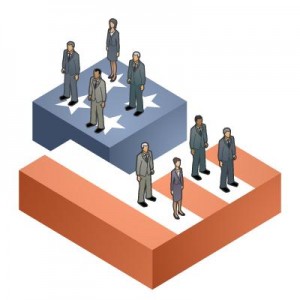Widgetized Section
Go to Admin » Appearance » Widgets » and move Gabfire Widget: Social into that MastheadOverlay zone
Why Aren’t More Women in Government?
The views expressed are those of the author and do not necessarily reflect the views of ASPA as an organization.
By Michael Faass
March 27, 2015
On Jan. 14, 2015, The Pew Research Center published a survey that provides some insight as to why more women are not in higher levels of government. The survey notes that while women are just as qualified, there are still barriers to overcome. According to the survey, the main barriers are considered serious perceptions that women deal with daily.
 Thirty-eight percent of the respondents felt that women are held to a higher standard, while 37 percent of the respondents did not think the country is yet ready to elect women leaders. Additionally, 27 percent did not think that women have enough influential connections or party support. Another 17 percent felt that having family responsibilities took too much time from their leadership positions.
Thirty-eight percent of the respondents felt that women are held to a higher standard, while 37 percent of the respondents did not think the country is yet ready to elect women leaders. Additionally, 27 percent did not think that women have enough influential connections or party support. Another 17 percent felt that having family responsibilities took too much time from their leadership positions.
Cheryl Preheim of KUSA radio in Colorado interviewed political analyst, Floyd Ciruli October 8, 2014. Ciruli was asked why women, who represent 50 percent of the total population, only represent 20 percent of the U.S. Senate and 19.3 percent of the U.S. House of Representatives.
He said he “expects the number of women in the highest political offices to go up because local numbers are growing.” However, Diana DeGette (D-CO) remarked, “at this level it is going to take us [women] 500 years to have parity in the U.S. Congress.” The Pew survey confirmed Ciruli’s opinion.
America is the land of the free and home of brave. Yet as a country we only rank 72 among the 190 countries that have a lower or single parliamentary/congressional house, according to Rutgers Center for American Women and Politics. What is even more surprising is that Rwanda is ranked number one, with women composing 63.8 percent of the voting members of its lower house. Bolivia and Andorra round out the top three with at least 50 percent of the house seats held by women.
While these three countries have at least 50 percent of its voting authority represented by women, and there are still another 187 countries where women do not have parity. It is a pretty sad state of affairs to realize that Afghanistan is 39 on the list and America is 33 places further down the list.
So is there a way to change the mindset of the American population to consider putting women in positions of authority in government? Maybe the more relevant questions are:
- Why aren’t more women in leadership positions in government?
- Why aren’t more women running for higher level political offices?
I believe the Millennials will cause the biggest shift in the paradigm. Twenty years ago, same-sex marriages were illegal in almost all states. Now, 37 states have legal same-sex marriages. When Millennials have been interviewed about same-sex marriages, most simply say it is the right thing to do and it is a non-issue.
The Pew Research Survey noted that “when it comes to characteristics’ that apply specifically to political leadership, most Americans don’t distinguish between men and women. But among those who do draw distinctions, women are perceived to have a clear advantage over men in some key areas in politics.” Specific distinctions included the willingness to work out compromises, being honest and ethical, improving the quality of life and a willingness to stand up for their beliefs.
To further illustrate how women, regardless of their political affiliation, are more willing to compromise on important issues, when the government was shut down by the U.S. House of Representatives, Michelle Bachman (R-Minn.) came up to DeGette and said, “Diana, if there were more women around here, they would have never shut down the government.”
As it stands presently, the Democratic Party is poised to possibly nominate the first ever female to run for American presidency—Hillary Clinton. She will run against the yet-to-be named Republican candidate dejour. Could having a female presidential candidate for one of the parties help shift the paradigm? This question will evoke many opinions from many different think tanks and political gurus. And each opinion will have some merit.
But from my perspective, I believe a female running for president will indeed push the paradigm, because Millennials will cause the ultimate shift to more women in leadership positions in government. They are a segment of the population that does not accept ‘status quo’ which means electing another group of do-nothings. Millennials want results and to experience improvement not the same-old, same-old.


Follow Us!